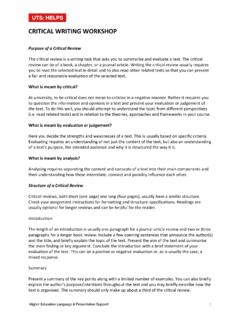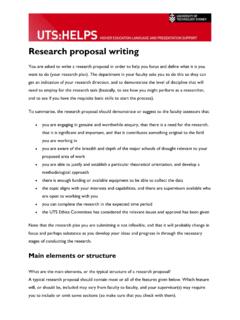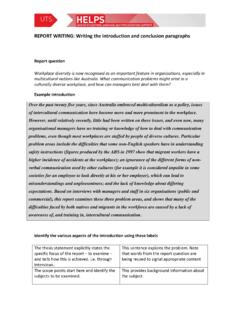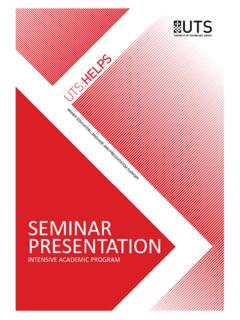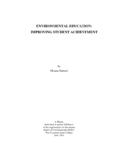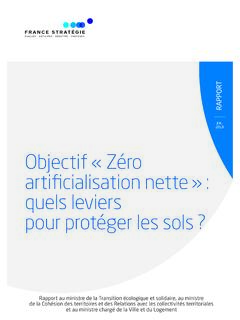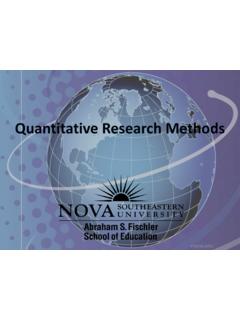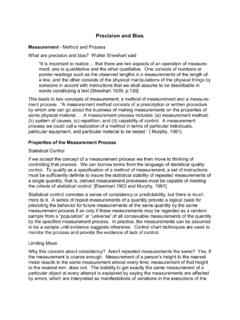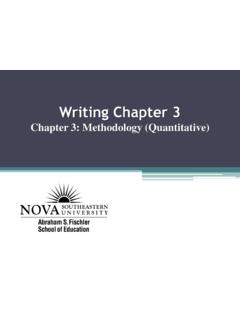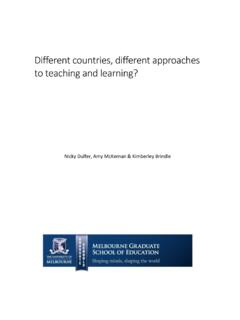Transcription of Adapting research methodologies in the COVID-19 pandemic
1 UTS CRICOS 00099F Adapting research methodologies IN THE COVID-19 pandemic Resources for researchers Contents Contents 2 Executive Summary 3 Acknowledgements 3 Background and contents 4 Background 4 Access to documents 4 Contents of this document 4 research method(ologie)s 7 Online research methods general 7 Ethics 7 Working with enumerators/local organisations 8 qualitative research 8 Netnography / virtual / digital / online ethnography, anthropology 8 Literary anthropology 9 Interviews 9 Focus groups 10 Mobile methods 10 Diaries 11 Photo/Video/Voice elicitation 11 Videos for ethnographic, auto-ethnographic or bio-logging (of the self and others) 12 Story completion 12 Auto- and duo-ethnography 13 Arts-based research 13 Semiquantitative and quantitative research 13 Online and phone surveys 13 Digital methods 14 Big data 15 Content analysis 16 Social media analysis 16 Spatial analysis 17 Social network analysis 18 Social simulation 19 Expert elicitation 19 Online discussions and resources 21 American Anthropological Association 21 CGIAR Platform for Big Data in Agriculture 21 Data collection in a time of multiple crises.
2 The social research response to COVID-19 , bushfires, and drought, ANU, 21 May 2020 21 Innovative Social research Methods Public Group 22 LSE School of Economics and Political Science 23 Resuming field research academic guidance 23 SAGE Ocean 23 Social Science research Council 23 Social Science Space 23 Using Mobile Phones for Survey research in the Time of COVID-19 Lockdowns and Beyond, PRCI, 29 May 2020 23 World Council of Anthropological Associations 24 UTS CRICOS 00099F UTS CRICOS 00099F UTS CRICOS 00099F UTS CRICOS 00099F UTS CRICOS 00099F UTS CRICOS 00099F Executive Summary This document is the first edition of a compilation of resources addressed to junior researchers whose social research projects have been affected by the COVID-19 pandemic . The resources contained in the document are intended for doctoral and postdoctoral researchers in social research at the stage of research design or data collection, and particularly for those involved in the research on ocean equity issues.
3 Researchers at this stage may have originally relied on face-to-face forms of human interaction to collect their data and they can no longer do so due to the mobility restrictions in place worldwide. This document offers guidance on potentially useful methods to help redesign their projects. The document has two parts. The first one offers an overview of qualitative , semi- qualitative and quantitative methodologies and methods that may provide feasible alternatives for research design and data collection. The resources listed are methodological texts and studies applying these methodologies in the social sciences in general, and in ocean issues in particular. The second part contains a list of online discussions and resources on how this adaptation is taking or may be taking place in the near future.
4 Over the next few months we will be updating this compilation with insights from academics and junior researchers on the opportunities and challenges involved in conducting social research during the COVID-19 . We will also be following the discussions on how methodologies and data collection methods may be evolving and we will include links to the recordings of these discussions where available. Acknowledgements This document has been made possible thanks to support from the Nippon Foundation Ocean Nexus at EarthLab (University of Washington). We are grateful for the valuable feedback provided by the Nexus group members, in particular Andr s Cisneros-Montemayor, Kate Crosman, Yoshitaka Ota, Chris Rothschild and Ana Spalding. The document was authored by Sonia Garcia Garcia and Kate Barclay.
5 Background and contents Background The purpose of this document is to provide resources for doctoral and postdoctoral researchers employing qualitative or mixed methods whose work is being affected by the current measures in place worldwide restricting mobility, gatherings of people, and face-to-face meetings for interviews. Methods of data collection that are prone to be impacted by the situation in COVID-19 include those that involve human interaction (conferences and meetings, interviews, ethnographic research ) and travel for data collection. qualitative researchers who would normally travel to field sites and interview people to collect their data face the need to modify their data collection instruments and may have to consider alternatives, such as document or media/social media analysis or using online platforms or telephone for data collection.
6 These tools offer new opportunities; however, their methodological fit to research questions, technical requirements, resource implications and ethical implications need to be adequately gauged. We address situations in which the researcher cannot travel and has to research from home (not tools for fieldwork research with social distancing protocols). These resources will be useful for researchers who need to adjust their data collection methods, and we also offer examples where methods can be used to provide complementary data sources to fieldwork. In a later edition of this document we will include insights from interviews with researchers to provide an overview of current practices and experiences that may be useful for people adjusting their research methods.
7 We will also address the potential of archival data as an alternative source, such as administrative or historical data, or data sharing practices. This document includes examples of methodologies that can be considered (including introductory texts to the methodologies ); examples of their application in different domains of the social sciences, especially in those areas of interest to researchers in ocean equity; and current discussions on how to adapt data collection methods. It could be that universities will be offering resources on changing data sources and analysis for projects on social topics and that some of these may be publicly accessible; we are conducting searches on these and we are including relevant resources and discussion fora. We welcome those of you who can and wish to contribute resources, papers or best practices to email us at Sonia s address.
8 Access to documents We have collated the pdfs of the materials listed in this document as a private group in the referencing software Mendeley ( ), so that Nexus researchers can access the documents directly, without having to search for them through their libraries. Please email Sonia Garcia at if you wish to be included in the group. In a few cases where the entire text is not available, a table of contents has been uploaded. Contents of this document This document is a compilation of methodological resources and current discussions on how to adapt research methodologies and data collection methods to the conditions imposed by the COVID-19 pandemic . We have collated the information obtained through the following: a desktop search on qualitative , semi- quantitative and quantitative research methods in Social Sciences research ; the adaptation of a collaborative document initiated by Deborah Lupton, SHARP Professor in the Centre for Social research in Health and the Social Policy research Centre at the University of New South Wales (Australia).
9 Prof Lupton s collaborative document offers guidance and examples of papers in qualitative research methods and it is the backbone of the qualitative section of this Nexus document. Professor s Lupton full document is available at: Lupton, D. (editor) (2020) Doing fieldwork in a pandemic (crowd-sourced document). Available at: #; a desktop search of papers in the topic area of ocean equity (from ocean and coastal management to fisheries or climate change) that illustrate the methodologies listed; a desktop search of academic resources, websites and online discussions on the topic, listed uin the Online discussion and resources section. To structure our searches, we have generally followed the research methods maps in the SAGE research methods database ( ).
10 First, we have looked at the main methods for qualitative (and mixed methods) data collection detailed in Figure 1: Figure 1. qualitative data collection methods (Source: SAGE Methods Map, available at ) The search includes methods that have been adapted to the technological possibilities offered by the Internet (methods with the Internet) and methods developed to research online interactions (methods in the Internet). The first possibility may suit researchers that wish to adapt fieldwork research to conditions where conducting research on the ground is no longer possible (for example, fishing communities that are observed or interviewed on site). The second possibility offers guidance on how to conduct research in the virtual world (for example, social media angler groups).
